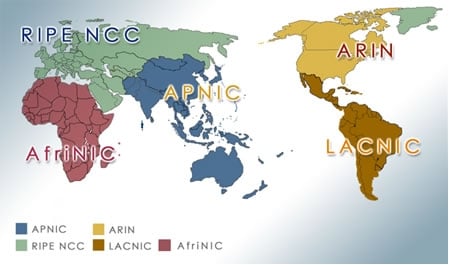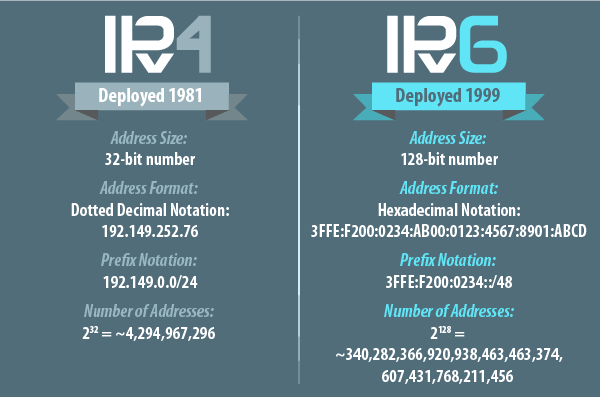
Medium-sized Business Growing Pains: How to Get Relief
February 25, 2014
All You Need to Know About IP Transfer Market
February 26, 2014For Part 1: The Truth About IP Address Regulation and Adoption click here!
By now you have gathered you use a lot of different IP addresses in your daily life. If you are a crazy about gadgets, you may be using 10 plus IPs right now! If you own a website, there’s another one. Do you use a home WiFi system? That is one another right there; you get the point.
Now think on a broader scale: there are 2.4 billion Internet users, 2.2 billion email users, 634 million websites, and 1.3 billion smartphones in use worldwide (Pingdom). Needless to say, billions of IPs are in use right this second.
What Happens When the Number of IPs Run Out?
As stated in part 1, “during the beginning stages of the internet, developers created a series of numbers – Internet Protocol version 4 (IPv4), to effectively and efficiently network between computers.”
IPv4 got its name due to the fact that the sequence of numbers in an IP address are broken down into four sections, three numbers in each section. In other words, an IPv4 address is 32 characters long. This totals to over 4 billion unique IP addresses.

4 billion unique IP addresses is not enough. As such, Internet Protocol version 6 (IPv6) was created to accommodate the growing number of internet users.
What Is IPv6?
Internet Protocol version 6 (IPv6) was created in 1993 when IETF first forecasted the depletion of IPv4 -occurring sometime between 2010 and 2017. This new protocol created 340 undecillion addresses that are used and managed similar to that of IPv4. IPv6 has been completed, tested, and made available since 1999 to ensure the continued growth of the Internet.
What IPv6 Means to End-Users
With IPv4 space running low the adoption of IPv6 is critical. Today all Internet Service Providers (ISPs) have the option to add IPv6 addresses to their existing network through a direct allocation from ARIN.
In a recent article by Chris Phillips, Phillips claims that making a network IPv6 capable is “astonishingly easy in most well-engineered networks” however ISPs are still not quick to deploy IPv6. Though they have the capability most ISPs do not offer the service to end-users. The choice is simple: you are either on an IPv6 network or you are not. Chances are you are not.
So if the world is running out of IPv4 addresses and you, as an end user, cannot get on an IPv6 network what happens next?

Well, nothing.
Although many debate how IPv6 affects end-users, many are not negatively impacted by the slow roll-out of IPv6 networks. The ‘web surfer’ in us all will still be able to access all our favorite websites regardless of our IPv4 or IPv6 status thanks to a special gateway that enables IPv6 networks to communicate with IPv4 addresses, and vice versa.
Depending on your network and that of the website you are visiting, the site load time may be a bit slower as the site tries to translate the content. Even though the user-experience is virtually unchanged there are some things end-users can do to ensure they enjoy the same level of service today, and down the line.
Ask Your ISP or Hosting Provider If They Offer IPv6 in Your Area
If you are not on an IPv6 network chances are your ISP has an IPv6 adoption plan in place, but may be very slow to develop it since there is little demand from end-users. Reach out to your ISP or hosting provider and ask them about their IPv6 roll-out date.
With only one IPv4 address for every 7.88 Americans still available through ARIN, you want to ensure your ISP is acting fast to ensure their network will not be affected by the inevitable depletion of IPv4. Ask them what their scale plans are this year and 5-years down the line. Can you trust them to make a seamless shift when the time comes?
Ensure That You Are A “Good Internet Citizen” Today, Not Tomorrow
It’s easy to buy a domain name and host the site with some ISP but are you sure that your website is IPv6 capable? All equipment supports IPv6 and so should your latest web venture. Before you invest in that next website, make sure that your web hosting provider has your site IPv4 and IPv6 capable – that is two IP addresses, one for IPv4 and one for IPv6.
Report Anything That Seems Fishy…
With the decrease of available ‘free’ IPv4 space, companies are doing anything they can to secure IPs. Unfortunately, some companies are resorting to ‘hijacking’ IPs to carry out their business. Instead of waiting for ARIN to allocate IP blocks, companies are finding unused blocks and ‘announcing’ them on their own network. ‘Hijacked’ IP blocks have a high chance of landing in your Inbox or Spam folder.
Instead of believing Spam is part of your email experience, report it! Although they do not deal directly with individual spam cases or other ‘illegal’ or ‘fraudulent Internet activity,’ ARIN does work with other nonprofit organizations, such as Spamhaus, to investigate full IP blocks and organizations suspected of Internet number resource abuse. Once reported on the web form ARIN will conduct a thorough investigation of the IP block. Based on the results of the investigation ARIN may even reclaim the IPs preventing any further abuse on the block.
To sum it up, report it! It is a win, win for everyone!
We are all part of the Internet community. Understanding how the internet works and how the technical stuff may affect your experience is something everyone should want to learn. And guess what, you just learned it!
Ask yourself the following questions:
– Is your network IPv6 capable?
– Is your website?
– Are you ready for the end of the internet as we know it?
What Does This Mean for Your Business?
Nearly every business in America has an online presence. From their website to the social media outlets they post on, businesses everywhere must consider how the internet will affect their end-goal.
Although IPs may seem a little far-reaching for the non-tech business to be concerned about, it really isn’t; businesses need to know how their audience connects with them and that may literally mean the IP address they are using.
Considering businesses directly tap into the backbone of the internet for their hosting needs, they need to understand how their business-critical hardware and network communicates with their audience. So the world is running out of IPv4 addresses what do you do now?
Figure out How to Get IPv6 Space—Ask Your Hosting Provider about Their IPv6 Offerings
Unfortunately IPv6 has had a slow adoption rate among ISPs. Although the technology exists and may even be “easy” to deploy, most ISPs’ networks are not IPv6. Even more worrisome, not all hosting providers or ISPs automatically offer IPv6 space included in their hosting packages.
Ensure that when you sign with a hosting provider that they offer IPv6 space with every server or website. Don’t forget to ask them about their network’s firewall and how it will affect your audience’s ability to engage with your business.
For example, xBox One by Microsoft which debuted last year was created using IPv6. Imagine that your audience starts surfing the web via xBox, how will they see your website? Will the lag from IPv4 to IPv6 converse cause you to lose a sell? As more people start to adapt IPv6, so must businesses.
Become A “Good Internet Citizen”
John Curran, CEO of ARIN, believes that there are Good Internet Citizens and, well, Less Pleasant Internet Citizens. To be part of the former, Curran urges businesses, as stated above, to use both IPv4 and IPv6 addresses on their website and network. This will enable, when the time comes, a swift and painless full adaption of IPv6.
Beyond the website, it is important to keep your ARIN, rather WhoIs information, current. If your business was allocated or assigned IP space and told to send your information for ARIN purposes, do it and keep it up-to-date! With a current and accurate WhoIs, ARIN can more efficiently and effectively technically coordinate and manage the IPs with their region.
Remember you are part of the Internet community. So the question is: Is your network IPv6 capable? Is your website? Are you ready for the end of the internet as we know it?